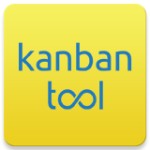In this comprehensive blog post, we will explore the world of project management software and help you make an informed decision when choosing the best project management software reviews for your needs. By the end of this post, you will have a solid understanding of what project management software is, its benefits, key features, and how to choose the right one for your organization. Additionally, we will provide an in-depth look at the top 5 project management software providers, along with their pros and cons. For more options, we recommend checking out the Serchen software marketplace here.

Best Project Management Software
What Is Project Management Software ?
Project management software is a tool that helps organizations plan, manage, and execute projects efficiently by providing a centralized platform for collaboration, task management, resource allocation, and reporting. These project management software solutions streamline the project management process, making it easier for teams to collaborate and complete projects on time and within budget.

Benefits Of Project Management Software
Improved Collaboration
Project management software allows team members to collaborate in real-time, share updates, and work together more efficiently. By providing a central hub for communication, these project management tools ensure everyone stays informed and aligned on project goals and progress.
Enhanced Time Management
With project management software, teams can easily track time spent on tasks, set deadlines free plan more, and prioritize work. This helps ensure projects stay on schedule and resources are allocated effectively.

Increased Visibility
By powerful project management software offering a visual representation of project progress, project management software helps teams identify bottlenecks, monitor performance, and make data-driven decisions. This increased visibility leads to more effective project management and ultimately, better results.
Resource Management
Project management software allows project managers to allocate resources effectively, ensuring that team members are not overworked or underutilized. This helps balance workloads and ensures that projects are completed on time.
Streamlined Reporting
By providing a centralized platform for tracking project data, project management software makes it easy to manage projects, generate reports and analyze performance. This helps teams identify areas for improvement and make data-driven decisions to optimize project outcomes.

Project Management Software Key Features
Task Management
Task management is a core feature of project management software. It enables users to create, assign, prioritize, and track tasks throughout the project lifecycle. With task management, teams managing projects can stay organized and focused on their goals.
Timeline and Gantt Chart View
Timelines and Gantt charts provide a visual representation for time tracking of project progress, deadlines, and dependencies. These views make it easy to track project milestones and ensure that tasks are completed on time.
Collaboration and Communication
Project management software offers collaboration and communication tools that these project management apps allow team members to share updates, ask questions, and collaborate in real-time. These tools help keep everyone on the same page and ensure that projects run smoothly.
File Sharing and Document Management
File sharing and document management features allow teams to securely store, share, and collaborate on project-related files. This helps to streamline workflows and ensure that everyone has access to the latest information.
Reporting and Analytics
Reporting and analytics tools enable teams to track project performance, identify trends, and make data-driven decisions. These insights help teams optimize project outcomes and improve overall efficiency.

Factors To Consider When Choosing Project Management Software
Scalability
As your organization grows, your project management software should be able to grow with you. Choose a solution that can accommodate your changing needs and scale to support an increasing number of users small teams and projects.
Customization
Each organization has unique project management requirements. Look for a software solution that offers customization options, such as custom fields, workflows, and dashboard views, to tailor the project management tool to your specific needs.
Integration Capabilities
To maximize efficiency, it’s essential that your project management software integrates seamlessly with your existing tools and systems. Consider a project management solution here that offers integrations with popular platforms like CRM, accounting software, and communication tools.

Security
Your project data is valuable and sensitive. Make sure the software you choose offers robust security features to protect your data, such as encryption, user access controls, and regular backups.
Ease of Use
A user-friendly interface and intuitive navigation are crucial for ensuring team members can quickly and effectively adopt the software. Opt for a solution that is easy to learn and use to minimize the learning curve and maximize productivity.

Project Management Software Use Case Examples
Marketing Agency
A marketing agency can use project management software to manage client projects, track deadlines, and allocate resources efficiently. The collaboration features can help team members work together on creative concepts, content creation, and campaign execution.
Software Development Company
A software development company can benefit from project management software to manage development projects, track progress, and ensure that deadlines are met. The software can help teams manage and prioritize tasks, identify dependencies, and collaborate on code reviews.

Construction Company
A construction company can use project management software to manage construction projects, allocate resources, and track progress. The software can help teams collaborate on blueprints, monitor budgets, and manage permits and inspections.
Non-profit Organization
Non-profit organizations can use project management software to manage fundraising campaigns, coordinate volunteers, and track progress towards goals. The software can help teams collaborate on event planning, donor outreach, and resource allocation.
Educational Institution
Educational institutions can use project management software to manage curriculum development, coordinate faculty, and track progress on research projects. The software can help teams collaborate on lesson planning, grant proposals, and departmental communication.

Potential Project Management Software problems
Learning Curve
Some project management software can be complex and take time to learn, which can cause delays in project implementation and user adoption.
Lack of Customization
If a software solution does not offer customization options, it may not meet the unique needs of your organization, resulting in inefficiencies and workarounds.
Poor Integration
Insufficient integration capabilities can cause data silos, limiting your ability to make data-driven decisions and streamline workflows.
Cost
Some project management software can be expensive, especially when you factor in licensing, implementation, and training costs.

Project Management Software Costs
Project management and project manager software costs can vary widely depending on the provider, features, and the number of users. There are typically three types of costs associated with project management software:
Licensing: Most providers offer subscription-based pricing, which can range from free plans with limited features to enterprise plans with advanced capabilities. Pricing can also be based on the number of users, projects, or storage capacity.
Implementation: The initial setup and customization of the software can require additional costs, such as consultation fees or setup charges.
Training and Support: Many providers offer training and support services, which may be included in the subscription price or available as an additional cost.

How We Choose The Best Project Management Software
Selecting the right project management software for your organization can significantly impact collaboration, efficiency, and overall business growth. With a variety of options available in the market, it can be challenging to choose the best one for your needs.
To simplify the decision-making process, we’ve conducted extensive research and analysis to identify the top project and task management tools and software companies in the industry.
Our methodology for selecting the best project management software vendors is based on several key factors. First, we considered the functionality and features offered by each software, including task management capabilities, collaboration tools, reporting and analytics, workflow management, and integration capabilities.
Second, we evaluated the user interface and ease of use, as well as the level of customization and integration with other business systems such as CRM, communication, and productivity tools.
We analyzed customer reviews and feedback on Serchen, as well as G2, and Trustpilot, to gauge user satisfaction and the level of support provided by each vendor. Additionally, we took into account the pricing and affordability of each solution, as well as the level of customer service and support offered.
By considering these factors, we’ve identified the top project management software vendors that offer the most comprehensive, user-friendly, and cost-effective project management solutions, for organizations looking to improve efficiency and drive business success.
Top 5 Project Management Software Providers
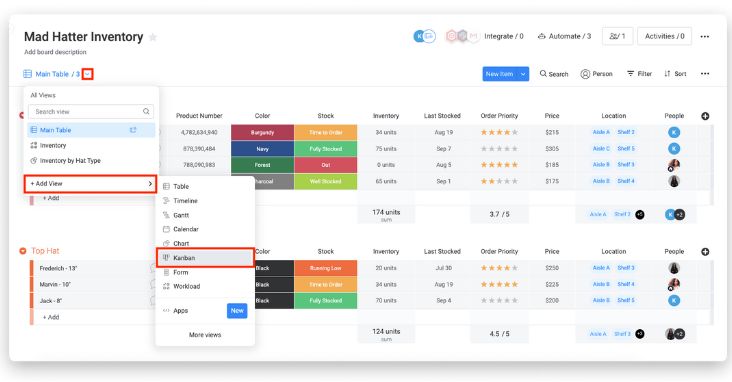
Monday.com
Monday.com is a flexible work operating system (Work OS) that enables teams to manage projects, workflows, and processes in a single, unified platform. Founded in 2012, Monday.com is known for its intuitive interface, customizable features, and a wide range of integrations.
Pros:
Highly customizable
User-friendly interface
Robust integration capabilities
Cons:
Can be expensive for large teams
Limited reporting features in lower-tier plans
Best fit customers: Small to medium-sized businesses, creative agencies, and technology companies.
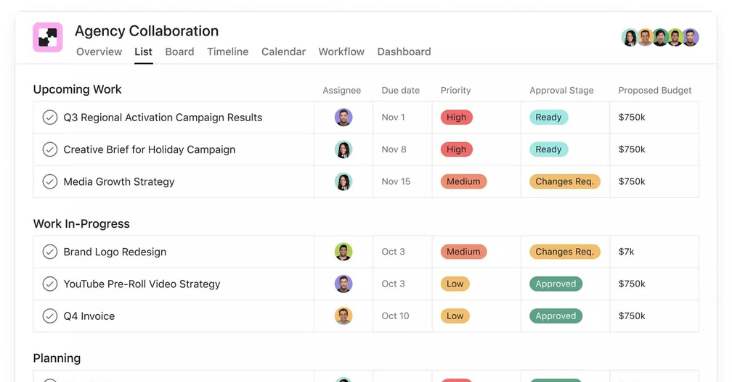
Asana:
Asana is a popular project management and collaboration tool designed to help teams stay organized and on track. Founded in 2008, Asana offers a wide range of features, including task management, timelines, and portfolio management.
Pros:
Intuitive interface
Comprehensive task management features
Strong collaboration capabilities
Cons:
Some advanced features are only available in higher-tier plans
Limited customization options
Best fit customers: Small to large businesses, marketing teams, and non-profit organizations.
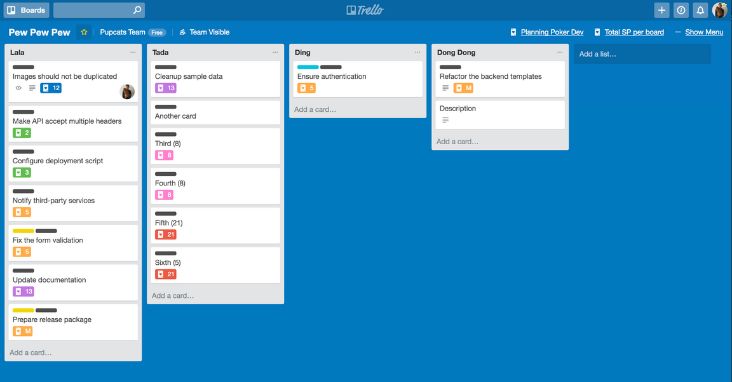
Trello:
Trello is a visual project management tool based on the Kanban methodology. Founded in 2011, Trello is known for its simplicity, ease of use, and flexibility.
Pros:
Simple and intuitive interface
Easy to learn and use
Affordable pricing
Cons:
Limited features compared to other project management tools
May not be suitable for complex projects
Best fit customers: Freelancers, small businesses, and teams looking for a simple and affordable project management solution.
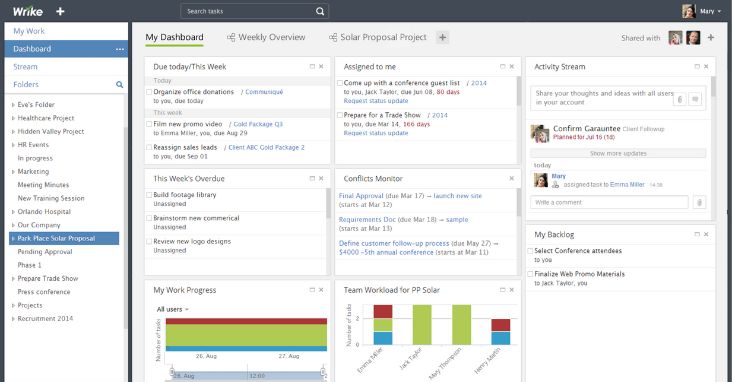
Wrike:
Wrike is a powerful project management and collaboration platform designed for teams of all sizes. Founded in 2006, Wrike offers a wide range of features, including Gantt charts, time tracking, and resource management.
Pros:
Extensive features for project management
Customizable workflows and dashboards
Scalable for growing organizations
Cons:
Steeper learning curve than some alternatives
Advanced features can be complex for some users
Best fit customers: Medium to large businesses, software development teams, and professional service firms.
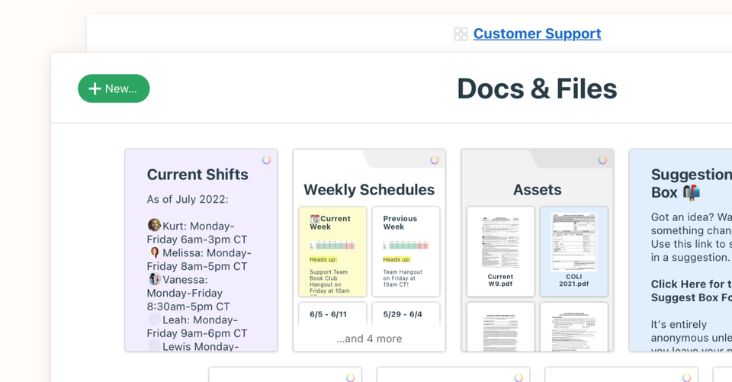
Basecamp:
Basecamp is an all-in-one project management and team collaboration tool that simplifies project communication and organization. Founded in 1999, Basecamp is known for its flat pricing model, intuitive design, and focus on team collaboration.
Pros:
Easy to use and navigate
Flat pricing model
Strong team collaboration features
Cons:
Limited task management features compared to other tools
No built-in time tracking
Best fit customers: Small businesses, remote teams, and organizations looking for a simple and affordable project management solution.

Project Management Software FAQ
What is project management software?
Project management software is a tool that helps organizations plan, manage, and execute projects efficiently by providing a centralized platform for collaboration, task management, resource allocation, and reporting.
How does project management software work?
Project management software works by providing a central hub for teams to create and manage tasks, track progress, allocate resources, and collaborate on projects. This streamlines the project management process, making it easier for teams to complete projects on time and within budget.
What are the key features of project management software?
Key features of project management software include task management, timeline and Gantt chart view, collaboration and communication, file sharing and document management, and reporting and analytics.
What are the benefits of using project management software?
Benefits of using project management software include improved collaboration, enhanced time management, increased visibility, better resource management, and streamlined reporting.
How much does project management software cost?
Project management software costs can vary widely depending on the provider, features, and the number of users. There are typically three types of costs associated with project management software: licensing, implementation, and training and support.
How do I choose the best project management software for my organization?
To choose the best project management software for your organization, consider factors such as scalability, customization, integration capabilities, security, and ease of use. Additionally, read user reviews on platforms like Serchen to gauge user satisfaction and vendor support.
Can project management software be used for remote teams?
Yes, project management software is designed to support remote teams by providing a centralized platform for collaboration, task management, and communication.
Is project management software suitable for small businesses?
Yes, project management software is suitable for small businesses and can help streamline project management processes, improve collaboration, and increase efficiency.
What is the difference between project management software and task management software?
While both project management software and task management software focus on organizing and tracking tasks, project management software typically offers more advanced features for managing resources, timelines, and reporting, making it more suitable for complex projects.
Can I use project management software for personal use?
While project management software is primarily designed for organizations, many tools offer personal plans or features that can be helpful for managing personal projects or tasks.

Project Management Software Tips and Best Practices
Prioritize user adoption
Ensure that your team is trained and comfortable using the software, as user adoption is critical to the success of your project management software implementation.
Customize the software to your needs
Take advantage of customization options to tailor the software to your organization’s unique requirements and workflows.
Integrate with existing tools
Maximize efficiency by integrating your project management software with other tools and systems your team is already using, such as CRM, communication, and productivity tools.
Set clear project goals and objectives
Clearly define project goals, objectives, and success criteria to help your team stay focused and aligned on priorities.
Monitor progress and adjust accordingly
Regularly review project progress and make adjustments as needed to ensure your team stays on track and meets deadlines.
Encourage collaboration and communication
Foster a culture of open communication and collaboration within your team to maximize the benefits of your project management software.
Leverage reporting and analytics
Use reporting and analytics features to gain insights into project performance, identify bottlenecks, and make data-driven decisions.
Keep security in mind
Ensure that your project data is protected by choosing a software solution with robust security features and implementing best practices for data protection.

Conclusion
Choosing the right project management software solutions can significantly improve collaboration, efficiency, and overall business success. By understanding the key features, benefits, and potential problems, you can make an informed decision on which project management app solution best fits your organization’s needs. We hope this post has provided valuable insights and actionable advice to help you make the best choice.
For even more software alternatives, we recommend exploring the Serchen software marketplace here.








